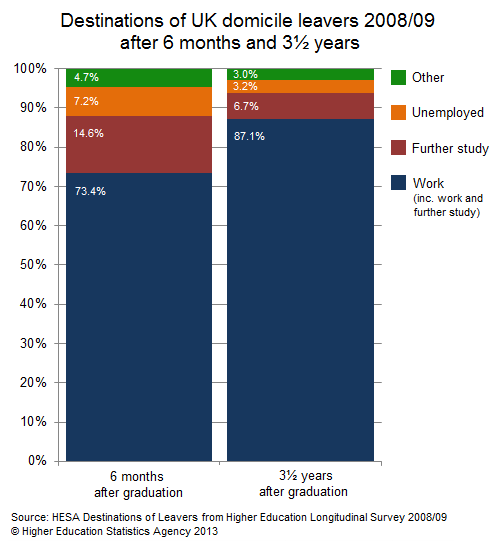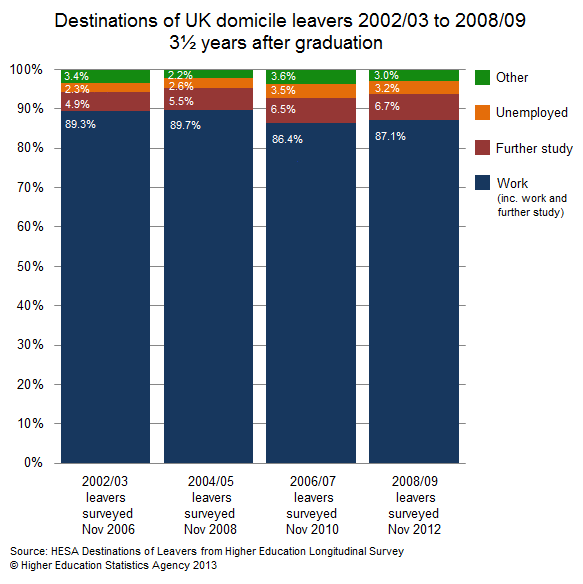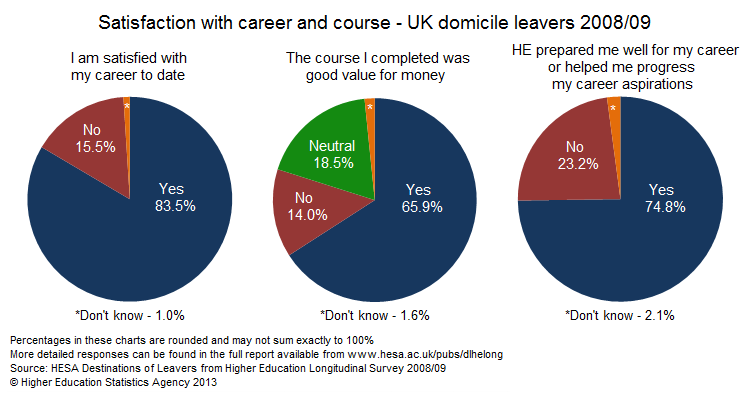Class of 2008/09 - Where are they now?
Results of the longitudinal survey of 2008/09 graduate destinations released today
A sample of graduates who left higher education in 2008/09 were asked what they were doing on 26 November 2012. The full report of the survey results is available on the HESA website. Summary results and charts can be found in the introduction.
Comparison with 6 month survey
87.1% of UK domicile leavers surveyed were in employment 3½ years after graduation. 6.7% were in further study only and 3.2% were unemployed. When the same cohort were surveyed in 2010, 6 months after graduation, 73.4% were employed, 14.6% were in further study only and 7.2% were unemployed.

Chart 5 and tables 5, 10 and 14 in the full report give more detailed comparisons of the early and longitudinal survey results.
Comparison with previous longitudinal surveys
The longitudinal survey is carried out every two years. The latest survey shows a small increase in the proportion of UK domicile leavers employed or in further study, and a small decrease in the proportion unemployed compared to the 2010 survey of leavers from 2006/07. However the unemployment rate is still higher than it was for 2004/05 leavers when they were surveyed in 2008.

Table 1 of the full report provides a time series broken down by level of qualification and domicile. The full report for each year's survey can be found here.
Satisfaction with career and course
The survey included qualitative questions about graduates' opinions and levels of satisfaction. 83.5% of UK domicile leavers said they were satisfied with their career to date. 74.8% thought that the course they had completed in 2008/09 had prepared them well for their career. 65.9% agreed that their course had been good value for money.

More detailed results for the opinion questions can be found in tables 20 and 21 of the full report.
Salary
The median salary of UK domicile full-time first degree leavers from 2008/09 who were in full-time paid employment was £24,000 pa after 3½ years. This compares with a median salary of £20,000 pa at the 6 month early survey.
Tables 11a to 11c of the full report provide salary data broken down by level of qualification, subject and gender.
Report
The full report, Destinations of Leavers from Higher Education Longitudinal Survey 2008/09, provides detailed information on the activities of students 3½ years after leaving higher education. The 27 tables in the free publication include activity and employment breakdowns by:
- Institution mission group
- Level and mode of qualification
- Gender
- Age
- Disability
- Ethnicity
- Class of first degree
- Subject of study
- Occupation
- Industry
- Location of employment
- Salary.
The introduction to the publication includes further charts summarising various aspects of the survey results.
Notes for editors
- Press enquiries should be directed to:
- Simon Kemp
HESA Press Officer
01242 211120
[email protected]
95 Promenade, Cheltenham, GL50 1HZ.
- Simon Kemp
- The Survey was carried out during winter 2012/13 by IFF Research and commissioned by the following higher education funding bodies:
- Higher Education Funding Council for England
- Scottish Funding Council
- Higher Education Funding Council for Wales
- Department for Employment and Learning (Northern Ireland)
- Department for Business, Innovation and Skills
- Research Councils UK.
- The Survey was completed by 62,205 leavers who had previously completed the Destinations of Leavers survey six months after graduating. The six month survey was completed by 354,730 leavers out of 470,940 eligible qualifiers from the 2008/09 cohort.
- Definitions of the terms used in this press release can be found here.
- HESA cannot accept responsibility for any inferences or conclusions derived from the data by third parties.
Ends

Press Officer
